But of course :) www.switch.box/mahprates
22.07.2025 19:17 — 👍 0 🔁 0 💬 0 📌 0Switchbox
@switch.box.bsky.social
A new think tank producing rigorous, accessible data on state climate policy for advocates, policymakers, & the public. www.switch.box
@switch.box.bsky.social
A new think tank producing rigorous, accessible data on state climate policy for advocates, policymakers, & the public. www.switch.box
But of course :) www.switch.box/mahprates
22.07.2025 19:17 — 👍 0 🔁 0 💬 0 📌 0
Forthcoming report! Heat pumps are systematically overpaying for the electricity they use. A new “heat pump-friendly” rate under consideration in MA would fix that imbalance, helping heat pumps beat natural gas on operating costs for most households. Report drops next Tue the 22nd, RSVP for webinar!
14.07.2025 15:49 — 👍 8 🔁 1 💬 1 📌 452.5Hz!
10.05.2025 14:31 — 👍 0 🔁 0 💬 0 📌 0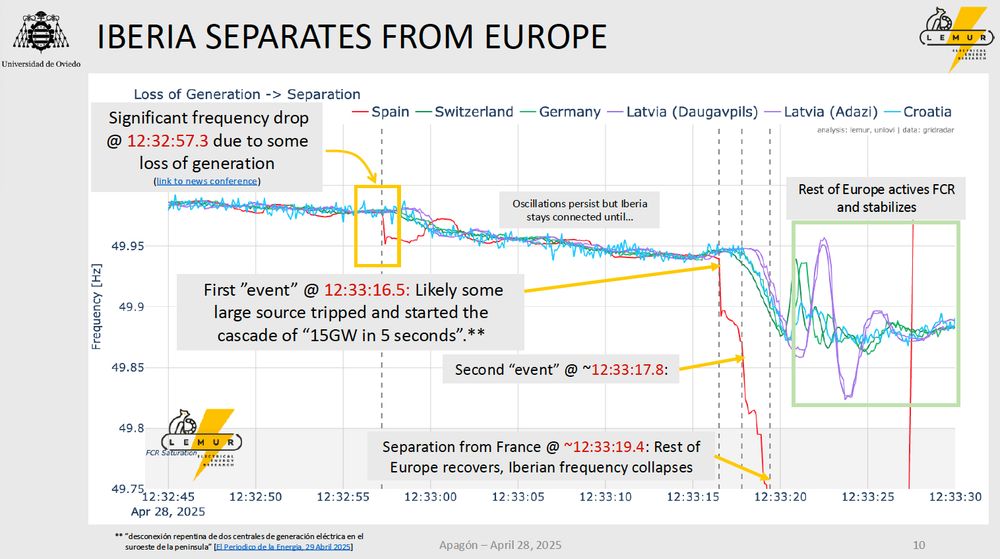
Probably nothing could have stopped the blackout once the 2 big plants went offline @ 12:33:16.5 (an "N-2" event). But the grid _did_ manage the initial generation loss ("N-1") at 12:32:57.3.
09.05.2025 16:13 — 👍 1 🔁 1 💬 0 📌 0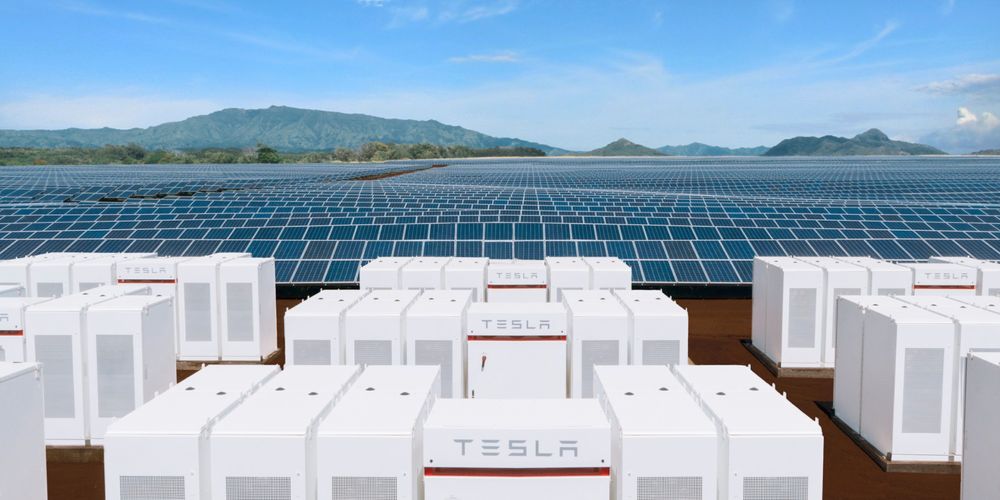
Absolutely possible with just GFM inverters: some island grids (eg Kauai) operate 90+% inverter-based resources (IBR) for most of the year, but rotational mass helps. The best is GFM + batteries: GFM mimics rotating inertia for the first few seconds as batteries ramp up to handle any imbalances.
09.05.2025 07:57 — 👍 1 🔁 0 💬 0 📌 0Credit to Rick Wallace Kenyon et al at #NREL for the graphic! They very literally wrote the roadmap for grid forming inverter research (link ⤵️)
www2.nrel.gov/news/detail/...
cc: @jessedjenkins.com @volts.wtf @ketanjoshi.co @robinsonmeyer.bsky.social
09.05.2025 00:34 — 👍 4 🔁 0 💬 0 📌 0Switchbox’s general stance: open data → curiosity → dialogue → insight. For the #apagon of April 28, we’re still in the open data phase (curiosity is kind of always on). Ask us questions if you’re curious about technical details! (9/9)
09.05.2025 00:05 — 👍 10 🔁 1 💬 2 📌 0So the blackout of April 28, unfortunate though it was, will be a training set for how solar, wind, and battery plants can and should (_and shouldn’t_) operate. But the lessons will come from researchers and engineers and modelers, and they need data. (8/9)
09.05.2025 00:04 — 👍 12 🔁 2 💬 2 📌 1So it’s not a hardware problem, its a software problem (solar and wind generally vs the controllers that feed their generation into the grid). Good news…software is cheap! And to develop good software, we need lots of training data. And standards! More for nerds 👇 (7/9)
09.05.2025 00:04 — 👍 15 🔁 1 💬 1 📌 0
It was the worst of inverters: Grid-following inverter controls can interact in weird ways, and this _could be_ (we don’t know yet!) one contributor to the sub-synchronous oscillations that were observed right before the blackout. Read this paper www.sciencedirect.com/science/arti... or 👇(6/9)
09.05.2025 00:03 — 👍 21 🔁 5 💬 2 📌 1It was the best of inverters: GFM inverter controls can actively damp out those undesired oscillations and keep the grid running smoothly. Btw #NREL and DoE do this research..let’s keep them at work. (5/9)
08.05.2025 23:59 — 👍 9 🔁 1 💬 1 📌 0A tale of two inverters: until now, most PV farms use “grid-following” inverter controls (GFL). These just follow the grid frequency signal, even if it’s going unstable. The world is moving quickly towards “grid-form” inverter controls (GFM), which actively help stabilize the grid. (4/9)
08.05.2025 23:57 — 👍 11 🔁 3 💬 1 📌 0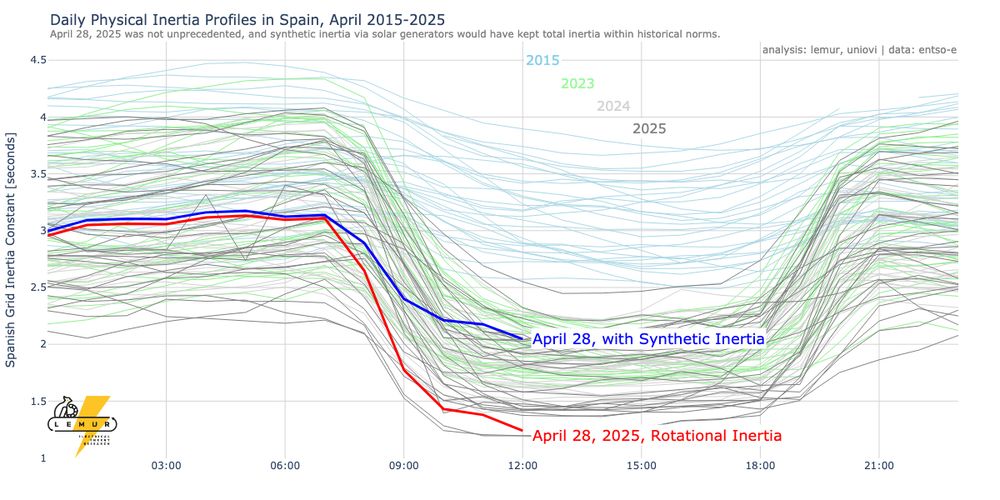
Generation loss was the proximate cause, but many blame solar plants for the conditions that made the Spanish grid unstable. Grids need inertia, and indeed _rotational_ inertia was low, but inverter-based resources can contribute synthetic inertia to achieve the same levels of resilience. (3/9)
08.05.2025 23:56 — 👍 20 🔁 2 💬 1 📌 0
Based on what public data we have, the blackout was triggered by a handful of large generators tripping offline in close sequence. From the first outage to the blackout was 19 seconds. Losing two generators is beyond the grid’s normal capabilities (an “N-2” event). Nerds: read more 👇 (2/9)
08.05.2025 23:53 — 👍 12 🔁 2 💬 1 📌 0Our energy modeling lead, Bryan Murray, studies electrical grid controls…in Spain! He needs to get something off his chest about the #blackout last week: PV & batteries did not cause the Iberian blackout. In fact they will be more crucial for grid stability going forward. Here's why #energysky (1/9)
08.05.2025 23:51 — 👍 47 🔁 25 💬 3 📌 2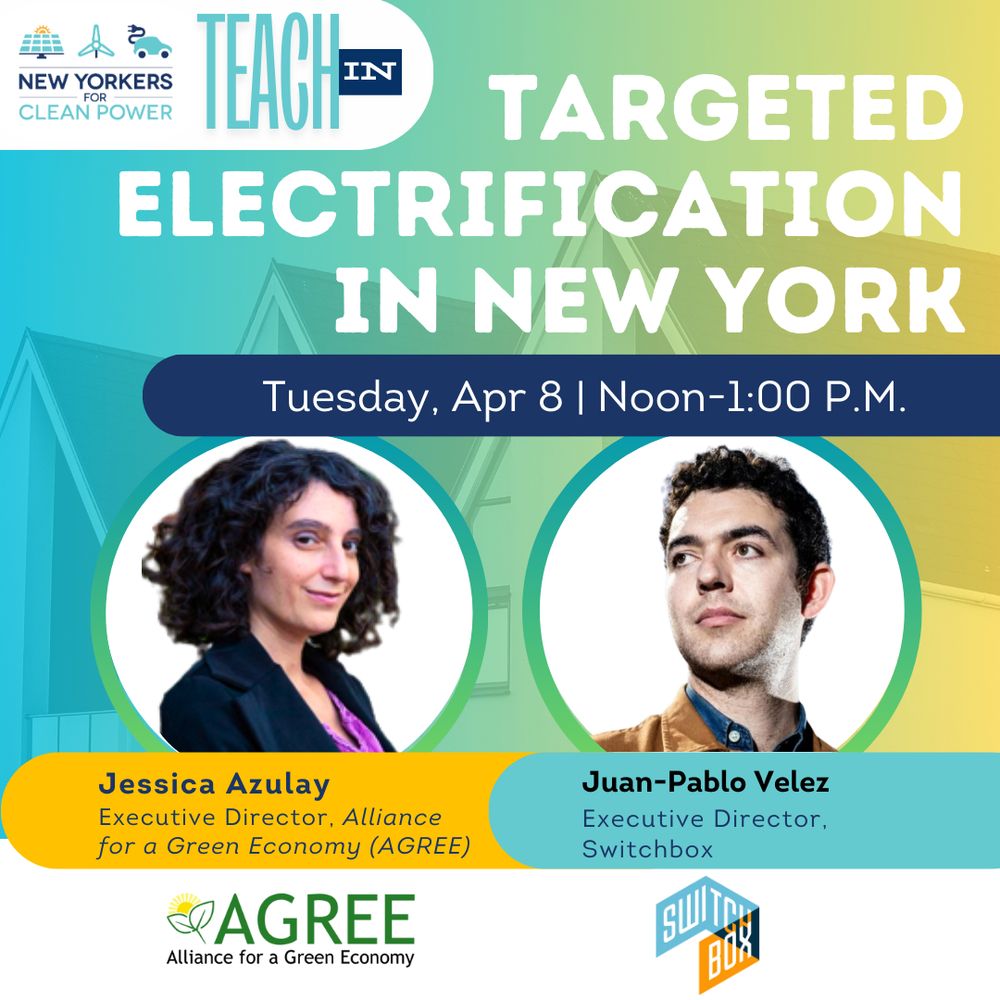
Graphic for Targeted Electrification in New York Teach in with Jessica Azulay, Executive Director of Alliance for a Green Economy (AGREE) and Juan-Pablo Velez, Executive Director of Switchbox. Tuesday, April 8, Noon to 1 P.M.
New York continues to spend billions on outdated gas infrastructure.
A new @switch.box report shows targeted electrification is a smarter, cheaper path— the NY HEAT Act can make it happen.
On 4/8, join us and @nyforcleanpower.bsky.social to learn more bit.ly/Electrify-NYS
#NYHEATAct
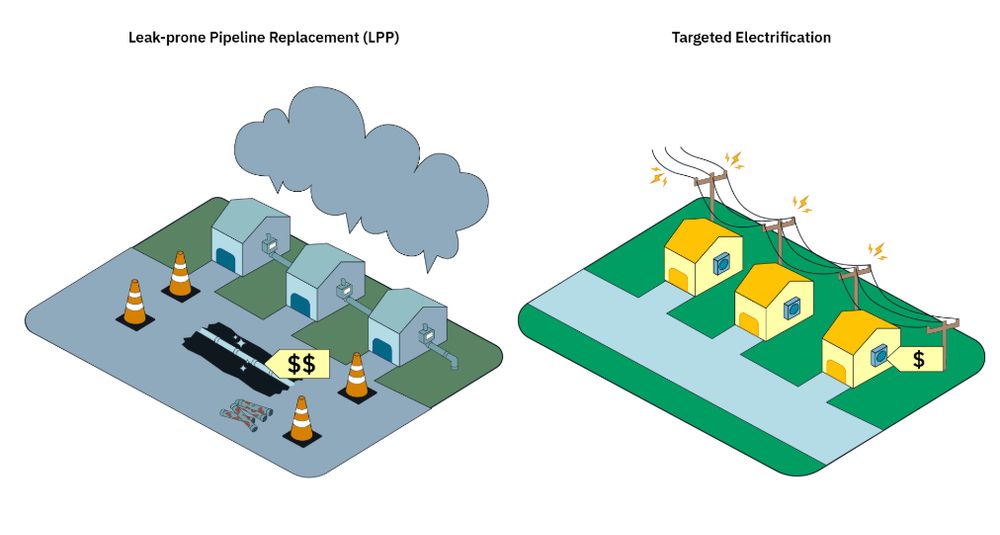
Illustration of the leak prone pipe replacement vs. targeted electrification
Our latest report asks a simple question: What if, instead of spending billions replacing aging gas pipes, utilities helped nearby homes switch to electric heating? The data shows this would often cost less, lower utility bills, AND cut pollution.Full report: switch.box/lpp Let's break it down: 1/6
28.03.2025 18:36 — 👍 80 🔁 34 💬 5 📌 8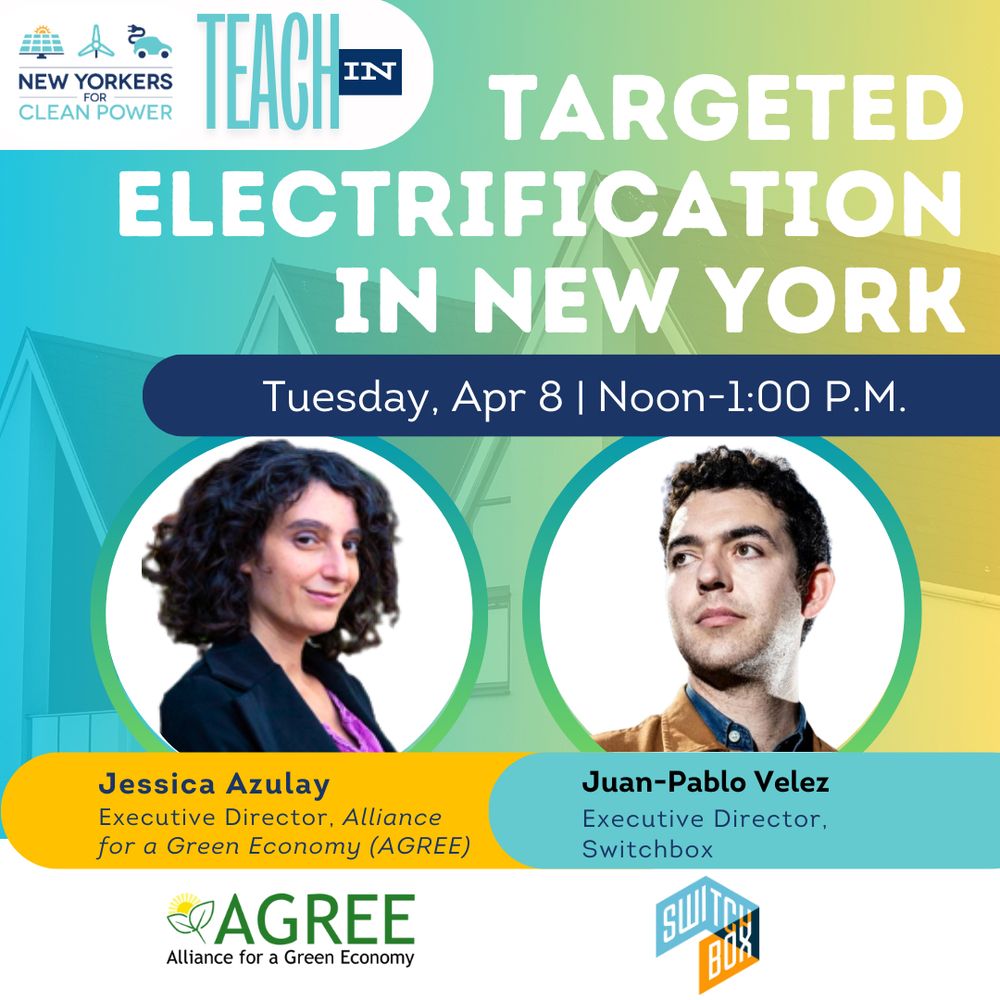
New York continues to spend billions on outdated gas infrastructure. A new report from @switch.box shows targeted electrification is a smarter, cheaper path— the NY HEAT Act can make it happen.
🗓️ April 8, 12 PM | Virtual
Register: bit.ly/Electrify-NYS
#Electrification #NYHEATAct
But, but, but! Policy reforms are needed to make this common-sense approach possible Right now, if even a single customer on a pipe segment says no projects cant move forward, NY HEAT currently in front of NYS would removethis hurdle. #nyheat 6/6
28.03.2025 18:42 — 👍 10 🔁 1 💬 0 📌 1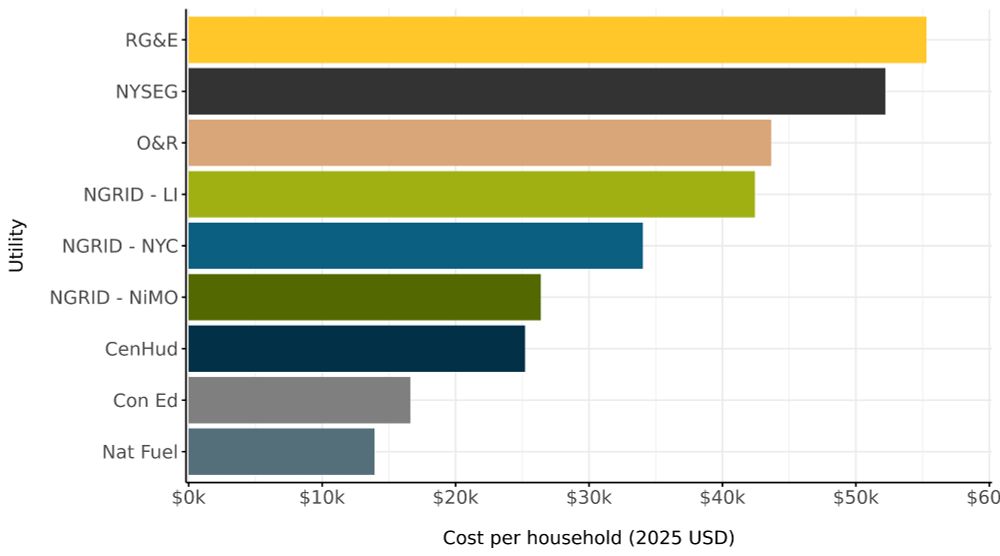
The median upfront costs per household to replace leak-prone pipleine in 2025 (2025 USD) by utility
Our analysis found this approach could save $4.7 billion through 2050 while electrifying over 313,000 homes. In the most suitable areas, it's about $10,465 cheaper per home to go electric than to replace the pipes—with savings growing to nearly $52,000 by 2050! 5/6
28.03.2025 18:41 — 👍 11 🔁 2 💬 1 📌 0"Targeted electrification" offers an alternative: Instead of replacing old gas pipes, utilities could help nearby homes switch to electric appliances. Think heat pumps instead of gas furnaces, electric stoves instead of gas ranges. 4/6
28.03.2025 18:39 — 👍 7 🔁 1 💬 1 📌 0To put these costs in context: New York utilities spent over two billion dollars on pipe replacement in 2022-23 alone. That’s more than twice what the state spent to cut emissions from building gas combustion. #energysky 3/6
28.03.2025 18:39 — 👍 8 🔁 0 💬 1 📌 0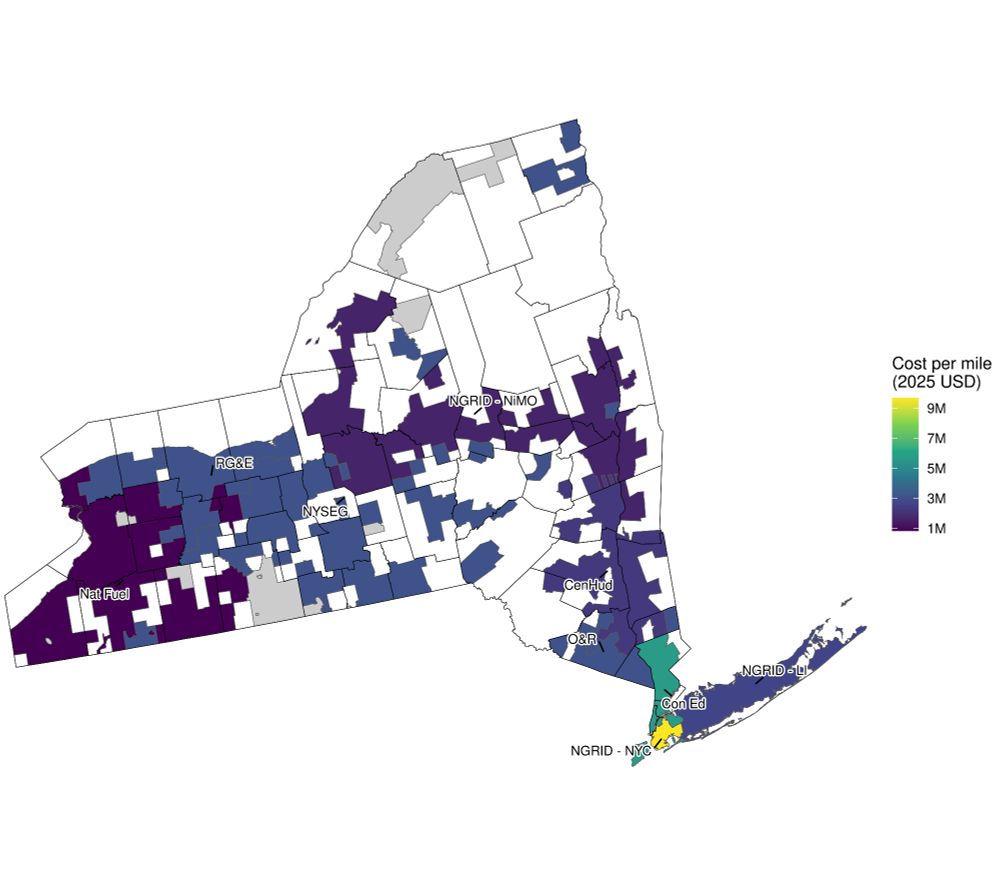
Map of leak prone pipe replacement costs per mile across utility service territories (2025 USD)
Here's the situation: We estimate NY utilities plan to spend $43 billion to replace leak-prone gas pipes by 2050, all of which will be paid back by hiking gas bills. But, gas use in homes and biz fell by 13% 2019-2024 and will likely continue falling as the climate warms and homes go electric. 2/6
28.03.2025 18:38 — 👍 15 🔁 7 💬 1 📌 0
Illustration of the leak prone pipe replacement vs. targeted electrification
Our latest report asks a simple question: What if, instead of spending billions replacing aging gas pipes, utilities helped nearby homes switch to electric heating? The data shows this would often cost less, lower utility bills, AND cut pollution.Full report: switch.box/lpp Let's break it down: 1/6
28.03.2025 18:36 — 👍 80 🔁 34 💬 5 📌 8
Map of leak prone pipe replacement costs per mile across utiltiy service territories (2025 USD)
Here's the situation: We estimate NY utilities plan to spend $43 billion to replace leak-prone gas pipes by 2050, all of which will be paid back by hiking gas bills. But gas use in homes and biz fell by 13% 2019-2024 and will likely continue falling as the climate warms and more homes go electric.
28.03.2025 18:30 — 👍 1 🔁 0 💬 0 📌 0
Our report on energy poverty in New York gets a shoutout in this @gothamist.com piece about gas bills being too damn high #energysky
31.01.2025 19:10 — 👍 1 🔁 3 💬 0 📌 1Preview! Dandelion Energy CEO Kathy Hannun will talk at this Thursday's Speaker Series event about what state's are getting right and wrong when supporting deployment of ground source heat pumps.
Don't miss it! RSVP here: lnkd.in/g4XF8A9s
📣 Tune in this Thursday (10/23) to hear from Kathy Hannun of Dandelion Energy about which policies are doing the most to speed — or impede — the deployment of ground source heat pumps. Come hear how your state ranks!
us06web.zoom.us/meeting/regi...
#climatesky #energysky
Our most recent report on NY's forthcoming Cap-and-Invest program was covered by Politico, along with another excellent study by @rff.org and @nycejalliance.bsky.social that reached similar conclusions about the transformative potential of putting a price on carbon in New York State. #energysky
14.01.2025 21:09 — 👍 2 🔁 4 💬 0 📌 0